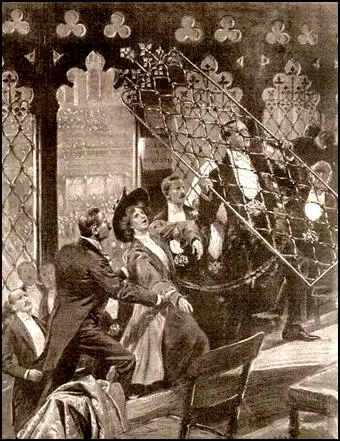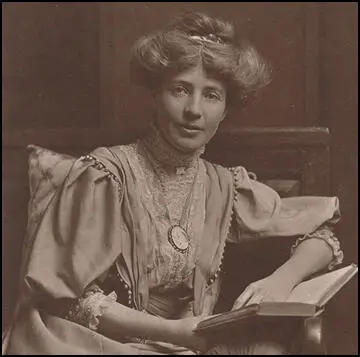Ladies' Gallery Demonstration
On 28th October 1908 Muriel Matters organised a Women's Freedom League demonstration that would gain the maximum publicity. Matters and Helen Fox were in the Ladies' Gallery of the House of Commons, then enclosed from the rest of the chamber by a metal grille. The two women interrupted the business of the house by demonstrating for women's suffrage. "While attached to the grille Matters, by a legal technicality, was judged to be on the floor of Parliament and thus, the words spoken by her that day are still considered to be the first delivered by a woman in the House of Commons." (1)

When officials made attempts to remove them, it was discovered that they had chained and padlocked themselves to the grille in such a way that in order to remove them the grille would have to be removed as well. The two women sat in a committee room until a locksmith was found to separate them from the thirty-foot long grille. (2)
Muriel Matters then went round to join the demonstration taking place in front of Parliament. Fifteen arrests were made including Muriel Matters, Violet Tillard, Arnold Cutler, Edith Bremer, Emily Duval, Margaret Henderson, Alison Neilans, Marion Leighfield. (3) Matters was charged with disorderly conduct and after being found guilty she was sent to Holloway Prison for a month. After her release she adopted the cause of prison reform. (4)

Primary Sources
(1) Exmouth Journal (31 October 1908)
Suffragettes cause of another scene in the House of Commons on Wednesday evenings. Two women chained themselves to the grille in front of the Ladies' Gallery, and a portion of the grille had to be removed by the police in order to release them…
Disturbances also occurred at the same time outside the House, leading to numerous arrests for disorderly conduct outside St. Stephen's Hall, and for attempting to harangue a throng at the base of the monument in front of the House of Lords. The two women who were the principal figures in the disturbances in the Ladies Gallery gave their names of Helen Fox and Muriel Matters…
No less than fifteen arrests were made in connection with the disturbances in St Stephen's Hall. They gave their names as follows: Arnold Cutler, Miss Violet Tillard, Miss Edith Bremer, Mrs. Emily Duval, Miss Margaret Henderson, Miss Alison Neilans, Miss Marion Leighfield… They were taken to Cannon Row Police Station, and were bailed out later.
(2) Laura Amy Fallon, The Guardian (11th October, 2013)
She has not been much celebrated in her homeland but Muriel Matters – an Australian-born suffragist who achieved notoriety in Britain after pulling off a series of brave and quirky stunts there in the early 1900s - is finally getting the recognition she deserves. New docudrama Muriel Matters!, featuring the suffragette's story, will premiere at the Adelaide Film Festival on Sunday, 13 October, and will also screen on ABC1 the following Tuesday.
Matters, an actor who left Adelaide for Britain when she was 28 to further her musical career, once sailed over London in an airship emblazoned with "Votes For Women", dropping leaflets for the militant Women's Freedom League (WFL).
She was also charged with disorderly conduct and imprisoned after chaining herself to "that vile grille" in the Ladies' Gallery of the British House of Commons in 1908. Obscuring women's view of parliamentary debates, the piece of ironwork was considered a sign of female oppression.
(4) Hannah Louise Awcock, Turbulent Londoners: Muriel Matters (8th March, 2018)
Not one to rest on her laurels, on the 28th of October 1908 Muriel took part in a dramatic protest at the House of Parliament organised by the WFL. They were protesting against an iron grille in the Ladies' Gallery that obscured the view of the House of Commons and was seen as a symbol of women's oppression. Muriel and another activist called Helen Fox chained themselves to the offending grille, and loudly lectured the MPs below on the benefits of women's enfranchisement. The grille had to be removed so that a blacksmith could remove the two women. Released without charge, Muriel rejoined the protest outside the House of Commons, and was eventually arrested for trying to rush the lobby. The next day she was sentenced to one month in Holloway Prison.
(5) Fayette Gosse, Muriel Matters: Australian Dictionary of Biography (2006)
Miss Matters lectured in Hyde Park and in 1908 took the first 'Votes for Women' caravan on a tour of villages in the south of England where she met Henry James, a supporter, at Rye. On 28 October she gained notoriety by chaining herself to an iron grille in the ladies' gallery of the House of Commons and declaiming women's suffrage aims. She was removed, still attached to the grille, and sent to Holloway Prison for a month; she adopted the cause of prison reform. Matters spent a year in Wales advocating votes for women and held meetings in Dublin. In 1909 she flew over London in an airship inscribed 'Votes for Women', scattering handbills over parliament. But she objected when more violent militants took over the movement.
(6) Frances Bedford, Muriel Matters (2020)
Matters was an extremely prominent member of a critical mass of people agitating for women's suffrage. Largely active between 1905-1924, she began her life of activism aboard the Women's Freedom League caravan which toured England's south-east. Although tirelessly campaigning for women's voting rights in the English Counties for many years, Matters is most recognised for chaining herself to the grille of the Ladies' Gallery in the British House of Commons on 28 October 1908. The ‘grille' was a piece of ironwork placed in the Ladies' Gallery that obscured the women's view of parliamentary debates. A symbol of the oppression of women in a male-dominated society, it was her firm conviction the grille should be removed. Her non-violent solution to chain herself to the grille was the centre-piece of a larger protest conducted by the Women's Freedom League. While attached to the grille Matters, by a legal technicality, was judged to be on the floor of Parliament and thus, the words spoken by her that day are still considered to be the first delivered by a woman in the House of Commons.

